Introduction
In a world filled with a myriad of dog breeds, few can rival the charm and charisma of the Bernese Mountain Dog puppy. Known for their striking tricolor coat and gentle disposition, these fluffy giants are the perfect blend of strength and sweetness. If you’ve ever seen one, you know they look like cuddly teddy bears with a touch of majesty. Whether you’re an experienced dog owner or a first-time puppy parent, the Bernese Mountain Dog brings joy and loyalty that makes them a beloved companion.
But before you rush out to adopt or buy one of these adorable pups, there’s a wealth of information you need to know. For starters, they aren’t just about their good looks; they come with a personality and care requirements that demand attention. These pups thrive on companionship, making them perfect for families. They’re known to be great with kids, forming bonds that last a lifetime. Just imagine a fluffy friend who’s always ready for a cuddle after a long day!
This guide isn’t just a love letter to the breed; it’s packed with crucial insights. You’ll learn about their history, which takes us back to the picturesque Swiss countryside, where they were bred as working dogs. Their temperament, which is nothing short of delightful, will be discussed so you can understand what makes them tick. Training tips will be provided to ensure your puppy grows into a well-mannered adult. Plus, we’ll cover health considerations you’ll want to keep in mind.
Are you ready to dive into the world of Bernese Mountain Dog puppies? By the end of this article, you’ll feel well-equipped to welcome one into your home and provide them with a loving, healthy environment. So grab a cozy blanket and a cup of tea, and let’s embark on this adorable adventure together!
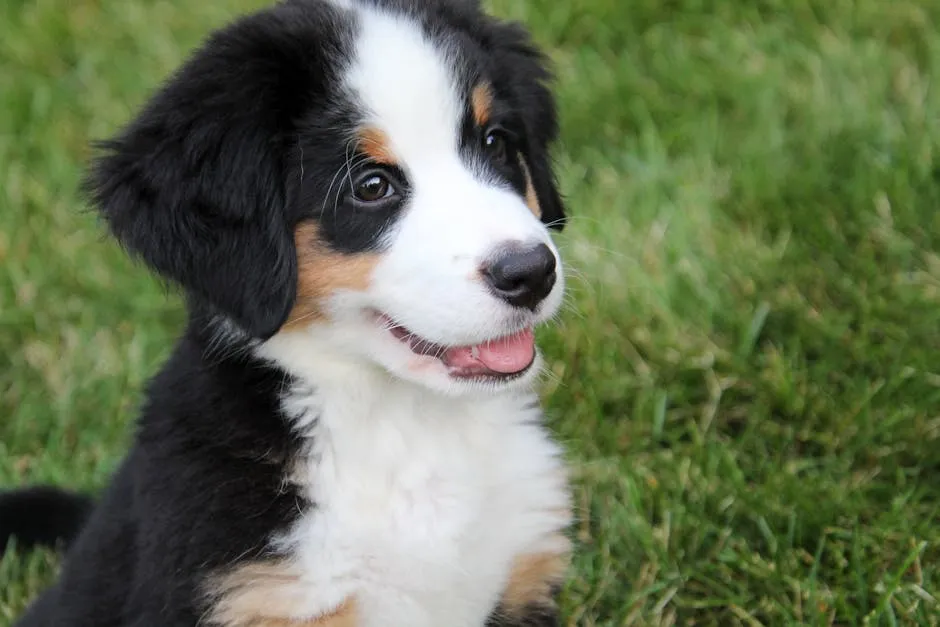
Summary of Key Points
This comprehensive guide will provide you with essential insights into Bernese Mountain Dog puppies, covering everything from their unique characteristics to their care needs. You’ll discover:
- Breed Characteristics: An overview of the Bernese Mountain Dog’s size, exercise requirements, grooming needs, and lifespan.
- Temperament: Understanding the gentle and affectionate nature of these dogs, including their suitability for families and children.
- Training: Best practices for training your puppy to ensure they grow into well-mannered adults.
- Health Considerations: Common health issues to be aware of, along with preventive measures.
- Growth and Development: Insights on how big they’ll get and what to expect as they mature.
- Grooming and Care: Tips on maintaining their beautiful coat and general health.
- Adoption Considerations: What to look for when choosing a reputable breeder and preparing your home for a new puppy checklist.
Preparing your home for a new puppy is essential for a smooth transition. Learn about the necessary steps to create a welcoming environment for your new furry friend.
By the end of this article, you’ll feel well-equipped to welcome a Bernese Mountain Dog puppy into your home and provide them with a loving, healthy environment. Get ready for a journey filled with fluffy cuddles and tail-wagging adventures!

What You Need to Know About Bernese Mountain Dog Puppies
Breed Characteristics
The Bernese Mountain Dog is a large breed, known for its impressive size and gentle demeanor. Males typically weigh between 80 to 115 pounds, while females range from 70 to 95 pounds. Standing around 23 to 28 inches tall, these dogs are hard to miss! Despite their size, they are known for being sweet and affectionate, making them excellent family companions.
Exercise needs for these pups are quite significant. They require at least one hour of activity daily to keep them happy and healthy. This could be a brisk walk, a game of fetch, or even a hike—something to keep their minds and bodies engaged!
When it comes to grooming, Berners have a medium-length coat that requires regular attention. Expect to brush their beautiful fur at least once a week, or more often during shedding seasons. Their lifespan ranges from 7 to 10 years, which is typical for large breeds.
The Bernese Mountain Dog belongs to the Working Group. This classification means they were bred for strength and stamina, originally assisting farmers in Switzerland. Their temperament reflects this heritage; they are intelligent, loyal, and eager to please, making them trainable. However, due to their protective nature, they may be reserved around strangers. Socialization from a young age is essential to help them become well-rounded adults.

History of the Bernese Mountain Dog
The Bernese Mountain Dog has its roots in the Swiss canton of Berne. Originally, these dogs were bred as versatile farm workers, pulling carts and herding livestock. They were known to help transport milk and cheese from the mountains down to the villages, showcasing their strength and adaptability. Their distinctive tricolor coat, featuring a mix of black, white, and rust, is as memorable as their charming personality.
However, the breed faced a dramatic decline in the early 20th century, nearly facing extinction. With the advent of modern machinery, the need for these hardworking dogs diminished. Thankfully, a few dedicated breeders took action to revive the breed. Their efforts paid off when Bernese Mountain Dogs were introduced to the United States in 1926. The breed gained recognition from the American Kennel Club (AKC) in 1937, allowing them to flourish as beloved family pets.
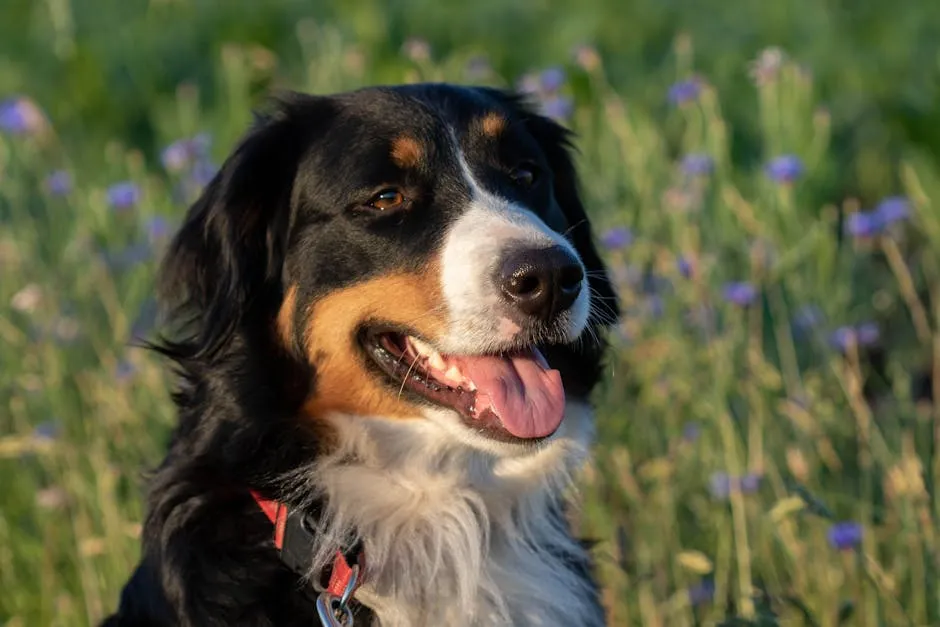
Temperament and Behavior
Bernese Mountain Dogs are known for their gentle and affectionate nature. They thrive on companionship, often forming strong bonds with their families. These dogs are incredibly patient and loving, making them fantastic companions for children. Their playful demeanor can turn any dull day into a joyous adventure!
While they are protective of their loved ones, they usually aren’t aggressive. Instead, they may be somewhat shy around unfamiliar people. Early socialization is crucial to help them feel comfortable in various situations and environments. Exposing your puppy to different people, pets, and experiences during their formative months will build confidence and reduce anxiety later in life.
Bernese Mountain Dogs often exhibit a strong desire to please, which can make training a delightful experience. They respond well to positive reinforcement and consistent commands. Remember, patience is key! With the right approach, your Bernese will grow into a well-mannered and loving adult.

Training Your Bernese Mountain Dog Puppy
Training your Bernese Mountain Dog puppy can be a joyful experience. These pups are smart and eager to please! Start with basic obedience. Use positive reinforcement techniques. Treats, praise, and play can work wonders. Consistency is key. Stick to simple commands like “sit,” “stay,” and “come.” Short training sessions keep their attention focused. Aim for 5 to 10 minutes, several times a day. This approach helps reinforce good behavior without overwhelming your pup.
To help with training, consider using a Dog Training Clicker. This handy tool is perfect for reinforcing commands and behaviors, making training sessions even more effective. Just click and treat—it’s that easy!
Using positive reinforcement is essential for training success. Discover effective techniques that work well with stubborn dogs.
Socialization is another essential part of training. Introduce your puppy to new sights, sounds, and smells. Take them for walks in different environments. Visit dog parks, neighborhoods, and pet-friendly stores. The more experiences they have, the better they’ll adapt as adults. Remember, Berners can be shy around strangers, so gradual introductions help build confidence.
Behavioral challenges may arise as your puppy grows. Common issues include chewing, barking, or jumping. Redirect unwanted behaviors with toys or commands. For example, if your pup chews on furniture, offer a toy instead. If they bark excessively, teach “quiet” as a command. Patience is crucial during this process. Remember, every puppy learns at their own pace.
Consistency and love will shape your puppy into a well-mannered adult. Training isn’t just about commands; it’s about building a bond. Enjoy the journey together!
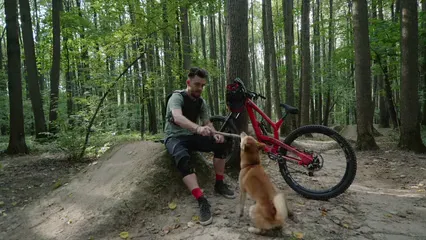
Health Considerations
Bernese Mountain Dogs are generally healthy, but they can face specific health issues. One of the most common is hip dysplasia. This genetic condition affects the hip joint. Regular check-ups with your vet can help monitor this. Early detection is vital for managing hip-related problems.
Understanding hip dysplasia is crucial for your dog’s health. Learn more about managing this condition effectively.
Bloat is another serious concern. This condition causes the stomach to fill with gas and can be life-threatening. Be on the lookout for signs like restlessness, a swollen abdomen, or attempts to vomit. If you notice any of these symptoms, seek immediate veterinary care.
Preventive care is essential to your puppy’s health. Regular vet visits help catch health issues early. Vaccinations, parasite control, and dental care are crucial. Discuss a proper feeding plan with your vet to ensure balanced nutrition. Maintaining a healthy weight will also reduce the risk of joint problems.

Consider a Pet First Aid Kit to have on hand for emergencies. You’ll feel more secure knowing you’re prepared for any mishaps, whether it’s a scraped paw or a sudden illness.
Consider pet insurance to help manage care costs. This way, you won’t stress about finances when emergencies arise. Keeping your Bernese Mountain Dog healthy and happy is a rewarding endeavor!
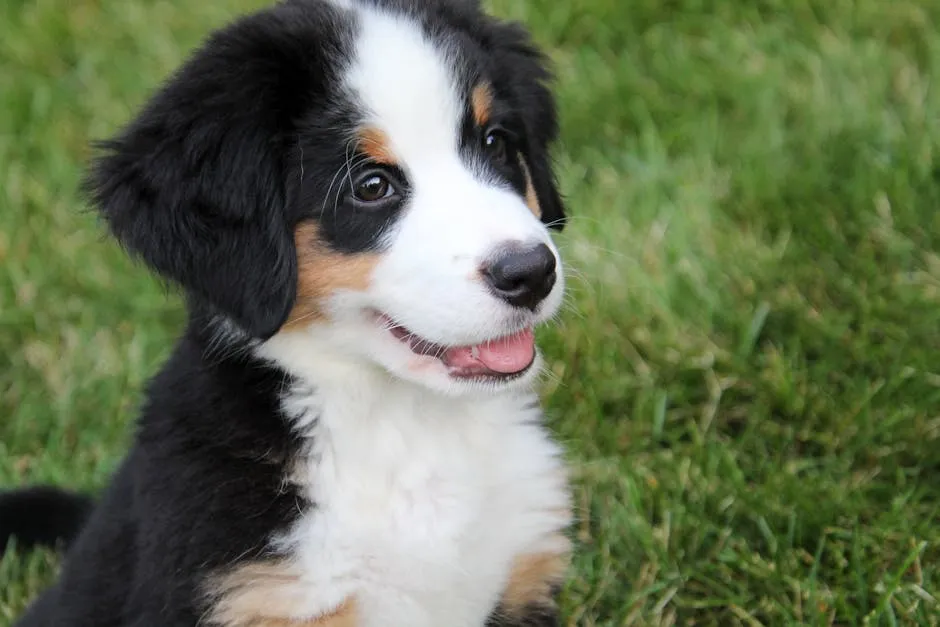
Growth and Development
Understanding your puppy’s growth is essential for their overall health. A Bernese Mountain Dog grows rapidly in their first year. By six months, males typically weigh between 50 to 70 pounds, while females range from 45 to 65 pounds. Their height will be around 19 to 23 inches at this age.
To track growth, refer to a growth chart. This tool helps you monitor weight and height as your puppy matures. Regular weigh-ins every month can spot any sudden changes. If your puppy is significantly under or overweight, consult your vet.
Signs of healthy growth include a shiny coat, clear eyes, and energetic behavior. If your pup seems lethargic or has a dull coat, it may indicate health issues. Ensure they have a balanced diet and regular exercise.
As for full size expectations, Berners typically reach maturity at around two years. Adult males weigh between 80 to 115 pounds, while females weigh 70 to 95 pounds. They stand about 23 to 28 inches tall at the shoulder. Understanding these growth patterns will help you provide the best care for your furry friend!
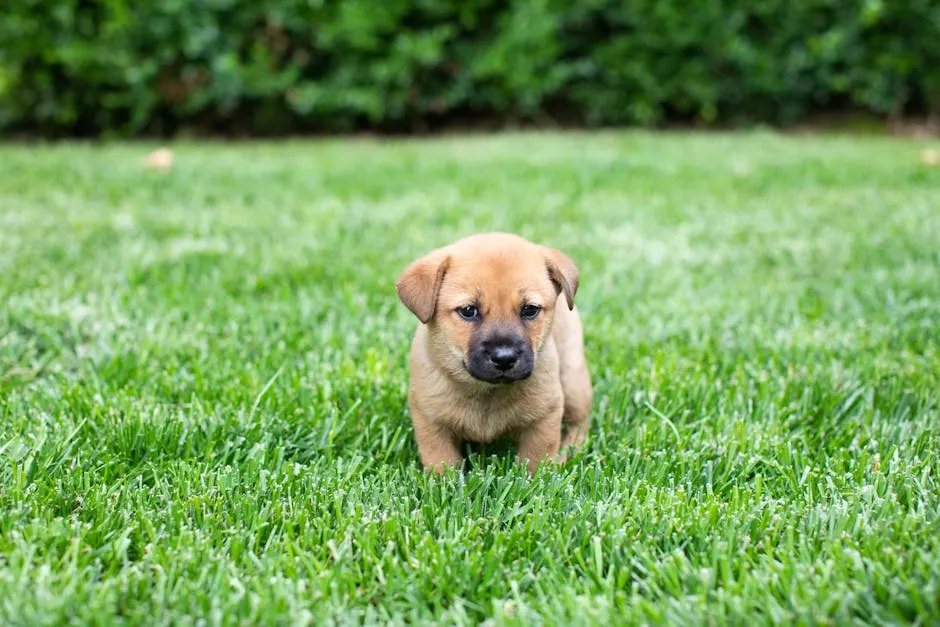
Grooming and Care
Caring for your Bernese Mountain Dog puppy is essential to keeping them healthy and happy. Let’s break down their grooming needs, exercise requirements, and nutrition tips.
Grooming Needs:
Berners have a stunning medium-length coat that’s a sight to behold! Regular grooming keeps their fur looking fabulous. Brush them at least once a week to prevent matting and control shedding. During the spring and fall, when they shed more, increase brushing to every few days. Use a slicker brush or an undercoat rake for best results. Don’t forget to check their ears and trim their nails regularly. A well-groomed pup is a happy pup!
Exercise Requirements:
These fluffy giants have a high energy level and need daily exercise to stay fit. Aim for at least an hour of physical activity each day. They love long walks, playing fetch, or joining you on hikes. Berners thrive on companionship, so consider activities that involve the whole family. They enjoy socializing with other dogs, too! A tired Bernese is a well-behaved Bernese, so keep them active to prevent boredom and destructive behavior.
Nutrition Tips:
Feeding your Bernese Mountain Dog puppy a balanced diet is crucial for their growth. Choose high-quality puppy food that meets their nutritional needs. Look for options rich in protein to support muscle development. Be mindful of portion sizes; obesity can lead to health issues. Consult your vet about feeding schedules and recommended brands. Fresh water should be available at all times. Treats are great for training, but don’t overdo it—keep their waistline in check!
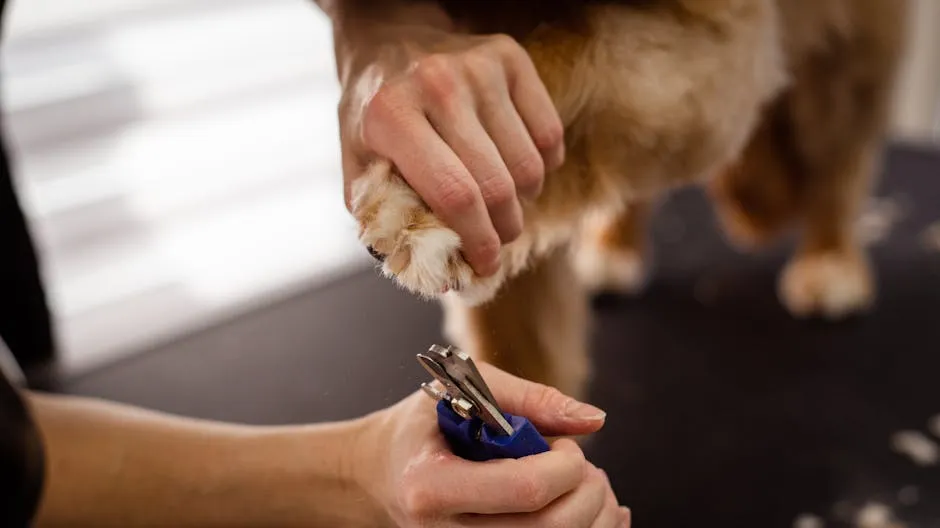
Adoption and Breeder Considerations
Welcoming a Bernese Mountain Dog into your home is a big decision. Here’s what you need to consider when adopting or finding a reputable breeder.
Finding a Reputable Breeder:
Choosing a responsible breeder is vital for your pup’s health. Look for breeders who prioritize health screenings for conditions like hip and elbow dysplasia. They should provide health clearances for both parents. Ask about their socialization practices and how they raise their puppies. A good breeder will welcome questions and encourage you to meet the puppy’s parents. This helps ensure that your future furry friend has a loving temperament.
Preparing Your Home:
Before bringing your new puppy home, get ready! Puppy-proof your space by removing hazards like electrical cords and toxic plants. Set up a cozy sleeping area with a comfortable bed. Stock up on supplies: food and water bowls, toys, grooming tools, and puppy pads. Designate a quiet space for your pup to retreat to when they need rest. A well-prepared home eases the transition for both you and your new furry companion.
Initial Costs and Budgeting:
Owning a Bernese Mountain Dog involves a financial commitment. Initial costs can include adoption fees, vaccinations, and spaying/neutering. Budget for high-quality food, regular vet visits, and grooming supplies. Don’t forget about the expenses for training classes and pet insurance! Planning ahead will help you manage costs and ensure your puppy receives the best care possible. Remember, investing in their health and happiness now pays off in the long run.
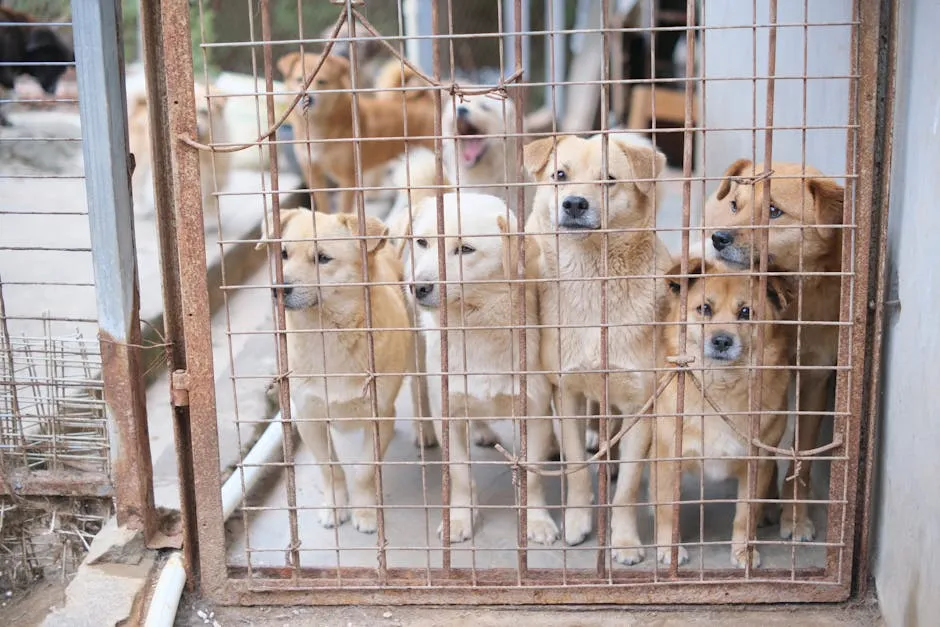
Conclusion
Welcoming a Bernese Mountain Dog puppy into your home is an adventure like no other! These gentle giants have a way of melting hearts with their affectionate nature and striking good looks. If you’ve ever wanted a loyal companion who’s always up for a snuggle, look no further. Their strong yet sweet temperament makes them perfect for families. They’re not just pets; they become beloved family members.
However, bringing a new puppy home isn’t just about the cuddles and cuteness. It’s essential to understand their needs to ensure a happy and healthy relationship. Bernese Mountain Dogs thrive on companionship, so prepare for a furry friend who will want to be by your side. They require regular exercise—think fun walks, playtime, and maybe even a hike or two. Keeping them active not only satisfies their physical needs but also helps with their mental well-being.
Grooming is another key aspect of ownership. Their beautiful, medium-length coat needs regular brushing to prevent matting and manage shedding. Embrace the grooming rituals as a bonding experience! And don’t forget about their health. Regular vet visits and a balanced diet are crucial in keeping your Bernese healthy and happy for years to come.

So, embrace the joy and challenges of puppy ownership. Get ready for a lifetime filled with laughs, tail wags, and unforgettable memories. Your Bernese Mountain Dog will bring immeasurable joy into your life, and you’ll find yourself wondering how you ever lived without them. With love, patience, and the right preparation, you’ll create a beautiful partnership that will last a lifetime.
FAQs
How much exercise does a Bernese Mountain Dog puppy need?
Bernese Mountain Dog puppies require about one hour of exercise daily. This can include walks, playtime, and other activities to keep them healthy and happy. They thrive on companionship, so consider activities that involve the whole family!
Are Bernese Mountain Dogs good with children?
Absolutely! Bernese Mountain Dogs are known for their gentle and affectionate nature, making them excellent companions for children. They’re patient and protective, forming strong bonds with their little humans.
What is the average lifespan of a Bernese Mountain Dog?
The average lifespan of a Bernese Mountain Dog is between 7 to 10 years. While they are large dogs, proper care and regular vet visits can help maximize their health and longevity.
How often should I groom my Bernese Mountain Dog?
These fluffy friends require grooming at least once a week to manage their medium-length coat. During shedding seasons, you might need to brush them more frequently—think of it as an opportunity to bond!
What health issues should I be aware of?
Bernese Mountain Dogs can be prone to certain health issues like hip dysplasia, bloat, and progressive retinal atrophy. Regular vet check-ups and a healthy lifestyle can help mitigate these risks.
Please let us know what you think about our content by leaving a comment down below!
Thank you for reading till here 🙂
Also, if you’re looking for a fun way to keep track of your furry friend’s adventures, check out this Bernese Mountain Dog Calendar! It’s a cute way to celebrate each month with a new picture of your fluffy companion.
Don’t forget to prepare for those training sessions with a reliable Dog Grooming Brush Set to keep that gorgeous coat in check!
And for those moments when your pup needs a little encouragement during training, make sure to have some tasty Dog Treats for Training on hand. They’ll make your training sessions even more rewarding!
Lastly, every puppy needs a safe space. Consider a Dog Crate for Training to help your pup feel secure and comfortable as they adjust to their new home.
All images from Pexels





